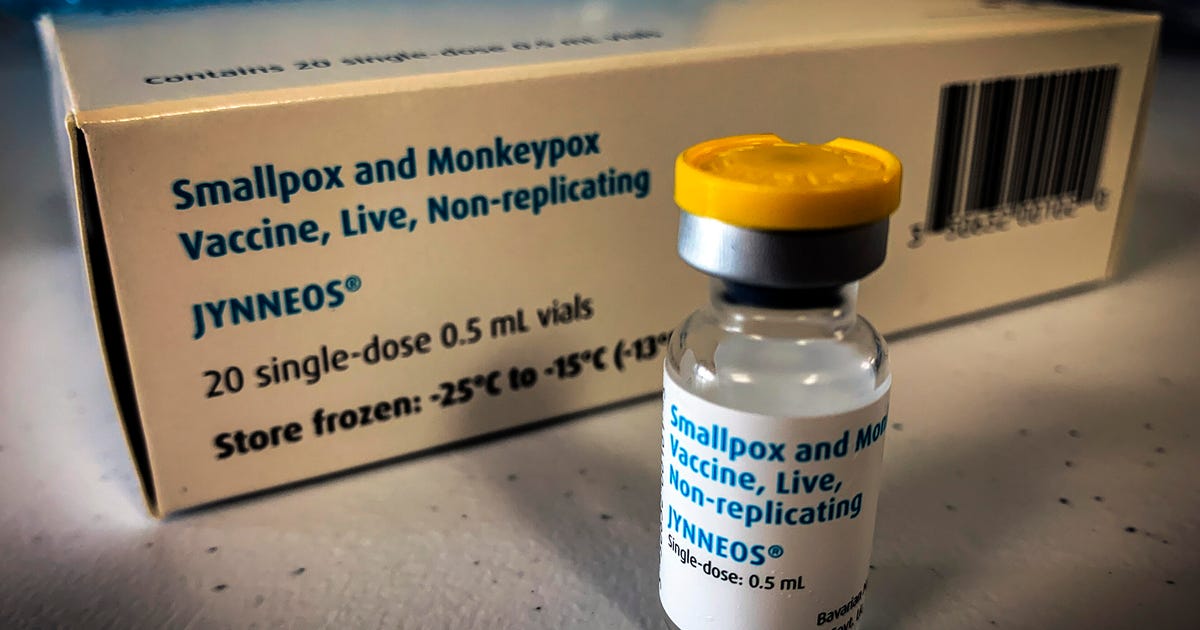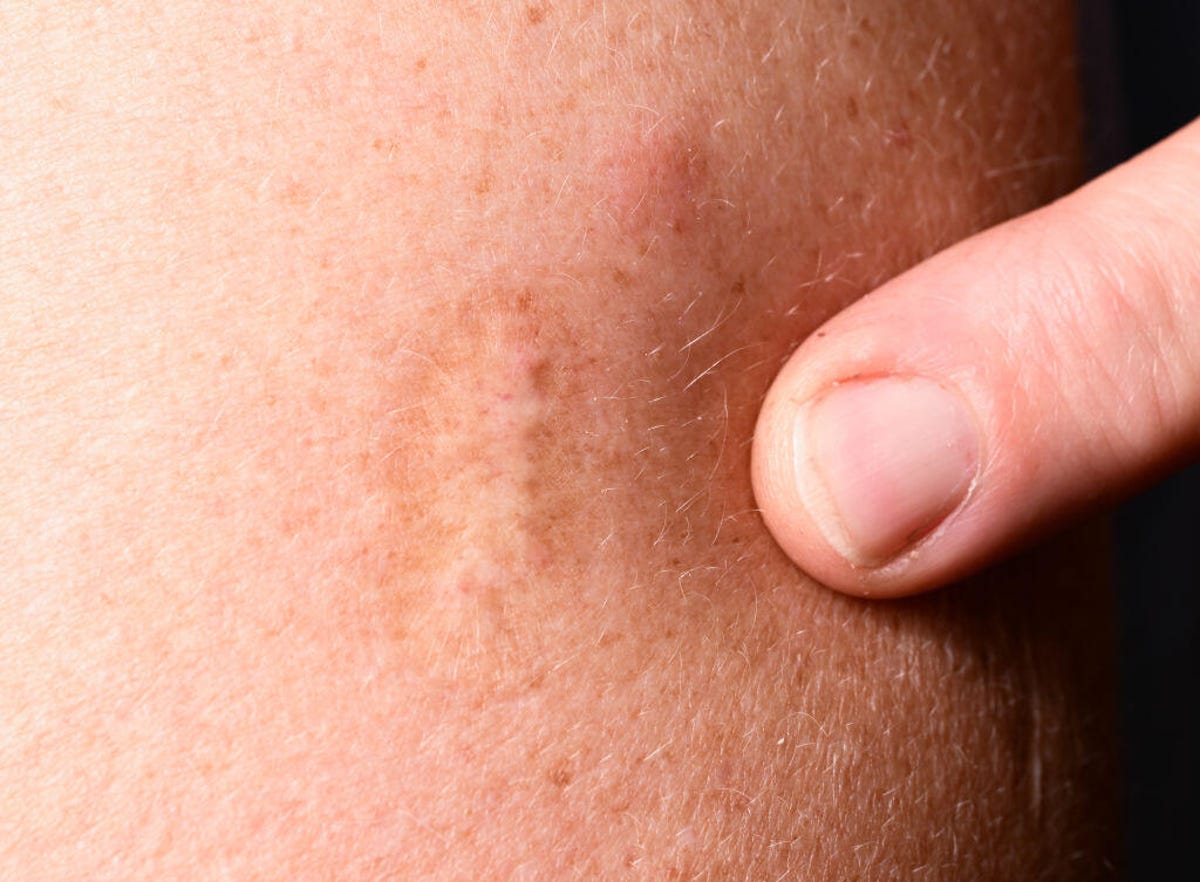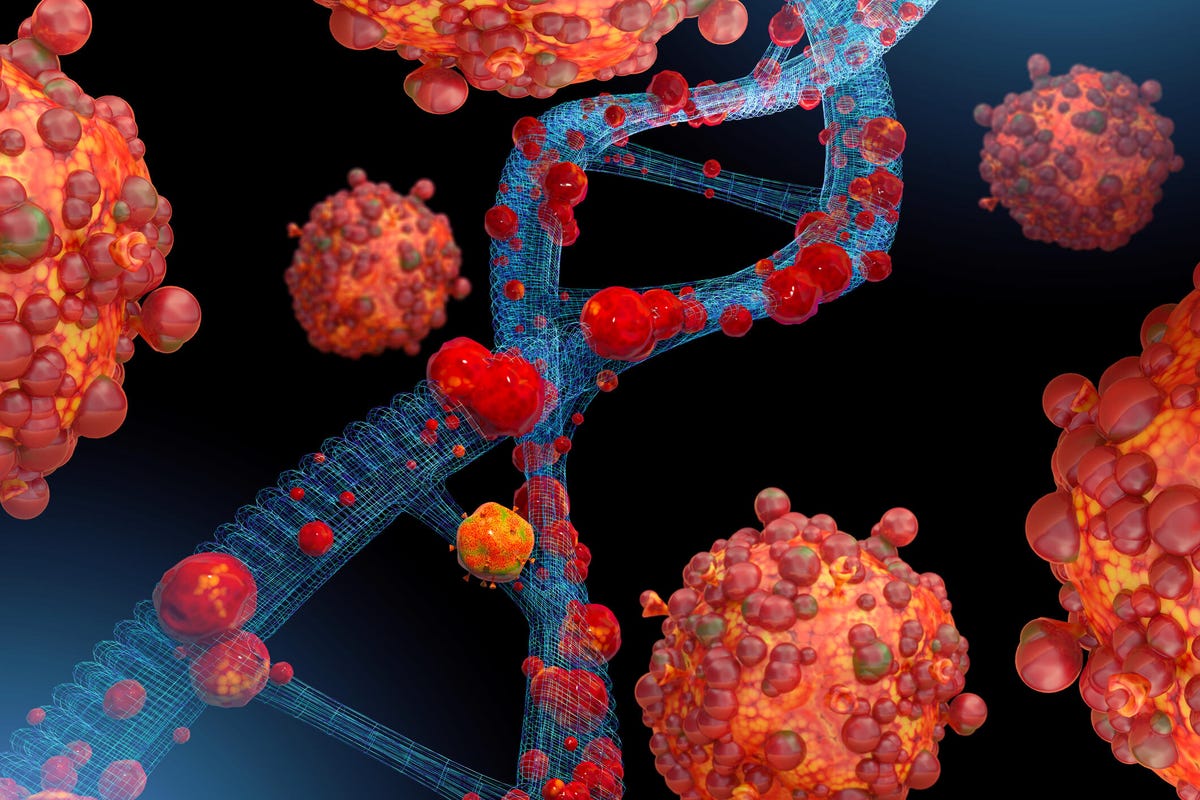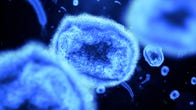
What’s happening
Vaccines are being offered to people at higher risk of monkeypox, but doses are limited.
Why it matters
Getting the vaccine before or after an exposure may cut your risk of getting the disease and slow its spread.
What it means for you
Some men who have sex with men are eligible for the vaccine, as are others who may have been exposed to monkeypox. Given limited supply, you’ll probably only get the first dose of the two-dose vaccine for now.
More than 5,000 cases of monkeypox have been confirmed in the US as of July 29, with that number expected to grow as testing increases. To slow the spread of the disease, health officials are releasing doses of a vaccine that’s approved for monkeypox and smallpox, but reports of trouble booking appointments as demand outpaces supply have riddled the public health response.
In an effort to move more resources to the outbreak, New York City — the epicenter of the monkeypox outbreak — joined New York state and San Francisco in declaring monkeypox a health emergency. In a July 30 press release, New York City Mayor Eric Adams estimated that about 150,000 New Yorkers are currently at risk of contracting monkeypox. As of July 29, more than 1,200 people have tested positive for monkeypox in the city.
Jynneos, the vaccine being shipped out to states and cities, is primarily for men who have sex with men and other people who may be exposed and are currently at higher risk in the outbreak. Federal officials have acknowledged that demand for the vaccine is outpacing supply, and the US Department of Health and Human Services has been shipping more doses to states. As of July 28, HHS said it has delivered 340,000 doses throughout the US, with plans to release an additional 786,000 doses.
The federal government has promised that 6.9 million doses total will be available by mid-2023, but some critics have warned that the public health response to monkeypox has been much too slow and that, by the time those doses are able to get into people’s arms, it may be too late to stop the disease from spreading widely in the US.
“We’re sort of playing catch-up,” said Dr. Amesh Adalja, an infectious-disease expert and senior scholar at the Johns Hopkins Center for Health Security.
In areas with a lot of cases, like San Francisco, New York City and Washington, DC, people who are eligible for the vaccine are getting only the first dose of the two-dose series. Officials say this will still offer protection against monkeypox and that it’s in line with the response in other countries, including Canada and the UK.
Here’s what we know about the Jynneos monkeypox vaccine and who’s eligible for it. Also, here’s what to know about ACAM2000, the older generation vaccine that also works against monkeypox.
Read more: Monkeypox Explained: Symptoms, Treatment and How It Spreads
Vaccine requirements: Who is eligible for monkeypox vaccine?
Exact criteria for who should get a monkeypox vaccine depend on the city or state people live in and how widespread the outbreak is there, but men who have sex with men and who have had multiple or anonymous sexual partners in the last two weeks are eligible in cities like New York. That’s because most cases in the current outbreak are in gay and bisexual men, though anyone with close contact to monkeypox can get the disease.
According to the CDC, you meet the criteria for a monkeypox vaccine if:
- You’re a contact of someone who has monkeypox or you were identified as possibly exposed via contact tracing.
- You had a sexual partner within the last two weeks who has monkeypox.
- You’ve had multiple sexual partners in the last two weeks in an area with a high number of monkeypox cases.
- You are a lab or health care worker who’s around orthopox viruses, including in animals.
If you’re concerned about monkeypox and think you might be at high risk for an exposure, look for your city’s and state’s current guidance. You can also also check with your doctor, or book an appointment for the vaccine online, a process that’ll walk you through the eligibility criteria. Here’s New York City’s vaccine appointment website. You can make an appointment and find a vaccine in San Francisco by calling one of the city’s clinics or visiting its drop-in location.

A smallpox vaccine scar. People born before the mid-1970s might have such a scar. Jynneos, a newer-generation monkeypox and smallpox vaccine, is not the same type of vaccine as the one used to eradicate smallpox and doesn’t leave a scar.
Picture Alliance/Getty Images
What are the monkeypox vaccines? Who has immunity from the smallpox vaccine?
The US has two vaccines that work against monkeypox in its national stockpile. Both are expected to work before a monkeypox exposure, as well as after an exposure but before symptoms start. (The fact that the vaccines work post-exposure sets monkeypox apart from diseases like COVID-19.)
Jynneos (made by Bavarian Nordic) is a new-generation vaccine approved by the US Food and Drug Administration in 2019 for monkeypox and smallpox. It’s a two-dose vaccine, with each shot given four weeks apart. It uses a weakened virus and is approved for adults 18 and older who are at high risk of getting monkeypox or smallpox.
Jynneos is the vaccine that is being shipped out and currently being used in the US monkeypox response. Because of limited supply, it’s likely you’ll only be able to book an appointment for the first dose for the time being. In New York City, for example, health officials say you’ll be contacted if you received a first dose about the second dose in the coming weeks.
ACAM2000 is a second-generation smallpox vaccine that also works against monkeypox. According to the CDC, ACAM2000 is a derivative of Dryvax, which helped eradicate smallpox. (The two diseases are closely related and both caused by orthopoxviruses, which makes this possible.) If necessary, the US Department of Health and Human Services said it’s also prepared to ship out the ACAM2000 vaccine, which is in greater supply than Jynneos but remains a second choice in the monkeypox response because it has a side effect profile that isn’t safe for certain people.
ACAM2000 is administered differently than the typical vaccine shot we’re used to. It’s given by dipping a needle into a vaccine solution which will then be “pricked” several times on the upper arm. It will cause a localized infection (a “pox”), prompting an immune response.
While ACAM2000 doesn’t cause smallpox, it contains live vaccina virus, which isn’t suitable for everyone. It could be unsafe for immunocompromised people, pregnant folks and those with certain heart or skin diseases, like eczema.
Smallpox was declared eliminated from the world in 1980. The US stopped routine vaccination against it in 1972, though some health care workers or people who work in labs may have had the vaccine. Historically, according to the CDC, smallpox vaccines were 95% effective against infection and protect you for about three to five years, and after that protection starts to wane.
Because of this, it’s possible people born before the early 1970s who got the smallpox vaccine might have some cross-protective immunity against monkeypox, according to the WHO, but there is “little immunity” to younger people living in non-endemic countries because they’ve had no exposure to a similar virus.
How effective are the vaccines against monkeypox? How long do they take to work?
If Jynneos is given within four days of a monkeypox exposure, that’s the best option for stopping the onset of the disease, according to the CDC. If it’s given four to 14 days after an exposure, the CDC says that Jynneos may not prevent monkeypox, but will likely reduce the severity of your symptoms.
The CDC says that the Jynneos vaccine takes two weeks (14 days) after the second dose for immunity to build, and that ACAM2000 takes four weeks for maximum immunity. Though many people are receiving only the first dose of Jynneos at this time, early research suggests that one dose will still offer some protection, at least for a shorter period of time.
Because the US outbreak of monkeypox is so new, there’s no data yet on exactly how effective the vaccines will be in the current situation, according to the CDC. Effectiveness of Jynneos against monkeypox is supported by animal studies, the agency says. And though it won’t be used in most cases, ACAM2000 is closely related to Dryvax, the vaccine that helped get rid of smallpox. Effectiveness of ACAM2000 is supported by animal studies as well as human clinical trials.
You should still self-isolate if you develop symptoms of monkeypox after getting vaccinated, such as a rash.

A computer image of a monkeypox virus.
Uma Shankar Sharma/Getty Images
Why does the US have a stockpile of monkeypox vaccines?
The US has a stockpile of Jynneos and ACAM2000 on hand not because the country was worried about an outbreak of monkeypox (which has been endemic in some African countries for years), but in case smallpox becomes a public threat again. Smallpox was declared eliminated in the 1980s, and the last natural outbreak in the US happened in 1949. But smallpox is usually much more severe than monkeypox, and officials worry it could be used as biological warfare.
“The stockpile was created in the event of a biological weapons attack on the United States with smallpox,” Adalja says. In this event, health officials would not be rationing vaccines or using only the newer-generation vaccine, according to Adalja.
“If there was a smallpox attack, we would be using whatever vaccines we have to be able to deal with it,” he added.
The information contained in this article is for educational and informational purposes only and is not intended as health or medical advice. Always consult a physician or other qualified health provider regarding any questions you may have about a medical condition or health objectives.

